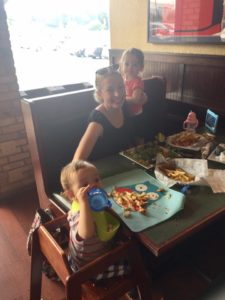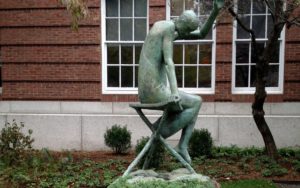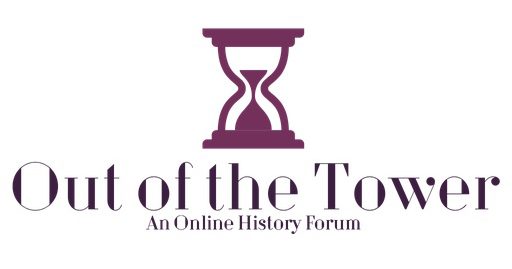In my heart, I define myself as a historian. But, truth be told, I spend the majority of my days taking care of my two young children. My son is one and my daughter is two. I am a stay-at-home parent and my children’s primary caregiver. As I detailed in a piece for New America Weekly, I dread it when people ask me what I do for a living. Why? Because although I have a PhD in history, my days primarily consist of changing a gross number of diapers, arguing with my toddlers, preparing meals that are ultimately rejected, and picking up an endless amount of clutter. It is hard to accept that most of the time I am only “mama.”
I had big dreams when I was a PhD student. My first goal was to revise and publish my dissertation as a book. My dissertation uncovers the competing civic ideologies embedded in the conflict over the Equal Rights Amendment. I also wanted to secure a job as a researcher in the world outside academia so that I could make an immediate and direct impact with my knowledge and skills. Finally, my husband and I wanted to start a family. The death of my father-in-law the day before my dissertation defense convinced us that we should start our family sooner rather than later. I thought I could have it all and more. I was pretty naïve. Even though I studied gender and women’s history for years, I failed to fully appreciate how hard it would be to juggle work and family demands.
 Less than a year after I received my PhD, I gave birth to my daughter. My son followed barely sixteen months later. Partly due to the high cost of child care, I decided to put my job search on hold. In the Washington DC metro area where we live, child care is expensive—to put it lightly. When I was pregnant with my second child, I had one job opportunity fall through because my potential employer (a non-profit organization) was unable to cover child care expenses. A similar situation happened with another job opportunity right after I gave birth to our son last spring.
Less than a year after I received my PhD, I gave birth to my daughter. My son followed barely sixteen months later. Partly due to the high cost of child care, I decided to put my job search on hold. In the Washington DC metro area where we live, child care is expensive—to put it lightly. When I was pregnant with my second child, I had one job opportunity fall through because my potential employer (a non-profit organization) was unable to cover child care expenses. A similar situation happened with another job opportunity right after I gave birth to our son last spring.
According to a regional estimate given at Care.com, if we used a full-time in-home caregiver, or nanny, we would have to pay around $46,800 a year. And, as New America’s Care Report documents, the average full-time cost for center care in the DC metro area is roughly $15,856 per child. [1]
The high cost of child care has severely limited my range of job options. Given the dismal state of job prospects for academic historians, it’s been difficult to find employment that would cover child care expenses. (And, that’s putting it mildly.) In short, we cannot afford for me to work outside of the home. For my family, having both parents employed fulltime is a luxury we cannot afford.
 There is another reason I have decided to put my career plans on hold: the sporadic, but nonetheless expensive nature of formal, part-time care As any parent of two young children knows, caring for two toddlers is an all encompassing and exhausting task. As my work on this website demonstrates, I have been able to complete some of my own writing and research when my children decide to take decent naps. But, of course, that is not something I can consistently count on. When I was actively looking for a job last year, I decided to rely on a babysitter to watch my children for three and a half hours, twice a week. It was my hope that during that time I would be able to carefully complete job applications, shape my resume and cover letters to specific job announcements, and schedule interviews. Even though it was expensive, I thought it would be a good investment.
There is another reason I have decided to put my career plans on hold: the sporadic, but nonetheless expensive nature of formal, part-time care As any parent of two young children knows, caring for two toddlers is an all encompassing and exhausting task. As my work on this website demonstrates, I have been able to complete some of my own writing and research when my children decide to take decent naps. But, of course, that is not something I can consistently count on. When I was actively looking for a job last year, I decided to rely on a babysitter to watch my children for three and a half hours, twice a week. It was my hope that during that time I would be able to carefully complete job applications, shape my resume and cover letters to specific job announcements, and schedule interviews. Even though it was expensive, I thought it would be a good investment.
Again, I was pretty naïve. In a single year, we went through four separate caregivers. One sitter cancelled on me several times at the last minute and then stopped taking my calls altogether. Another sitter left our daughter outside alone when I was upstairs preparing for a phone interview. (Our daughter was seventeen months old at the time.) Left to her own devices, she ended up drinking a bottle of bubbles, which led me to frantically call poison control. That incident caused me a level of anguish that I cannot even put into words.
At the end of last year, I began to reevaluate my plans in earnest when a leading consulting firm in Washington DC made it clear to me (during the final round of a long interview process) that it valued potential employees who could put workplace commitments above everything else (including family responsibilities). After that, I realized I would have to put my dreams on hold until my children started school.
This gets me to another underlying reason for why I decided to stay at home with my children. In the simplest of terms, my priorities have changed over the last two years. Now, I could write this off as a “natural” product of parenthood. And, in some ways that might be true. But, let me be clear, I am not trying to make any appeal to some sort of “motherly instinct.” Because of my own work in this area, I am highly suspect of such claims. (Based on my research, I believe that our understandings of motherhood are the result of socially created concepts and not essential products of nature.)
 Nonetheless, for reasons I will get into shortly, my outlook on life has changed significantly since I have had children. Even though I sought to be a selfless person before I had my children, I still placed my dreams, needs, and desires first (mostly unconsciously). Now that I am a parent, everything about me comes second. Because my children are still so young, their needs come first—always. No matter what I might think that I need, those wants come second to what is going on with my children at any given moment. And, that’s not because for some sanctimonious reason I want to be putting myself last.
Nonetheless, for reasons I will get into shortly, my outlook on life has changed significantly since I have had children. Even though I sought to be a selfless person before I had my children, I still placed my dreams, needs, and desires first (mostly unconsciously). Now that I am a parent, everything about me comes second. Because my children are still so young, their needs come first—always. No matter what I might think that I need, those wants come second to what is going on with my children at any given moment. And, that’s not because for some sanctimonious reason I want to be putting myself last.
Trust me, I wish things were different, but as I was forced to realize in the first months of my daughter’s life, young children do not self-regulate. We have to teach them everything (sleeping, eating, you name it—it is not instinctual; it is taught). My children’s lives entail that I put their health first. My kids have no idea that they can seriously injure or kill themselves. (They are able to weapon-ize everything.) Their development is still so basic that the concepts of health and safety elude them. Since my children’s welfare demands 100% focus, and because we cannot afford consistent child care, I have had to adjust the previous dominance of my career goals.
 But, there is also another deeper cause for my shifting priorities. This is a hard topic for me to discuss. In the past two years, my family has dealt with several health crises. In the spring of last year, right before I gave birth to my son, my father was diagnosed with stomach cancer. That was not the only cancer diagnosis we had to face that spring. From then to now, we have had four deaths in my family on my father’s side. My father is a fighter and he will continue to fight, but the deaths of my grandparents and two of my aunts have been a lot to bear. All of this has forced me to face a very difficult question: if I knew everything was going to be gone tomorrow, what would I cling to the most? The answer: my children. They might drive me utterly nuts, but ironically enough, they are the source of my strongest sense of peace.
But, there is also another deeper cause for my shifting priorities. This is a hard topic for me to discuss. In the past two years, my family has dealt with several health crises. In the spring of last year, right before I gave birth to my son, my father was diagnosed with stomach cancer. That was not the only cancer diagnosis we had to face that spring. From then to now, we have had four deaths in my family on my father’s side. My father is a fighter and he will continue to fight, but the deaths of my grandparents and two of my aunts have been a lot to bear. All of this has forced me to face a very difficult question: if I knew everything was going to be gone tomorrow, what would I cling to the most? The answer: my children. They might drive me utterly nuts, but ironically enough, they are the source of my strongest sense of peace.
Now, I haven’t given up on my work as a historian. I continue to revise my dissertation for publication as a book. I also continue to write fresh pieces for this website, which shed light on the processes of teaching history and doing historical research, as well as putting current events into historical perspective. I also take on freelance projects when such work pays enough to cover childcare or when my responsibilities as a fulltime parent allow me to squeeze in additional duties. My goal is return to work fulltime once my children are in school.
As it stands now, my work as an independent historian permits the necessary flexibility that is required for being the primary caregiver of two young children. Moreover, it preserves a crucial part of my identity. While being with my children provides me with a tremendous feeling of security, doing historical work (illuminating the complexities of history; deflating historical myths; and exposing historical truths) gives me the greatest sense of joy.
So here I am: a stay-at-home parent who labors as a historian whenever I find the chance. While I am finally at peace with this arrangement, I do wish our society were more obliging to parents who find themselves forced into roles that they did not envision for themselves. Whether it is parents like me (fulltime caregivers who also want to maintain a connection to work life outside of parenthood) or those that have been compelled to return to work when they would rather be home, I believe our society can do better. As I have written before, one way to ease so many parents’ distress would be to create an infrastructure of care that provides affordable, high quality care for children that has the option of being either part-time or full time.
 We also need a cultural transformation that forces us to recognize that family responsibilities and workplace commitments do not have to be held in opposition to one another. As New America’s Anne-Marie Slaughter puts it, “real equality, full equality, does not just mean valuing women on male terms. It means creating a much wider range of equally respected choices for women and for men.”[2]
We also need a cultural transformation that forces us to recognize that family responsibilities and workplace commitments do not have to be held in opposition to one another. As New America’s Anne-Marie Slaughter puts it, “real equality, full equality, does not just mean valuing women on male terms. It means creating a much wider range of equally respected choices for women and for men.”[2]
In other words, we need to provide men and women with real, unrestricted choices about whether to work inside or outside of the home. We need to understand that breadwinning and care giving are equally valuable and that neither one is essentially “men’s work” or “women’s work.” Such a societal readjustment would help to welcome stay-at-home parents back into the workforce (if and when they choose to return). Moreover, it would provide much needed societal support and appreciation for full time caregivers, which they all-too- often do not receive.
As always, I’d love to hear your thoughts. Please sound off in the comments section below.
~Rebecca DeWolf, PhD
[1]Brigid Schulte and Alieza Durana, The New America Care Report (Washington DC: New America, 2016) 6, 15, accessed 11 January 2017, https://na-production.s3.amazonaws.com/documents/FINAL_Care_Report.pdf.
[2] Anne-Marie Slaughter, “Can We All ‘Have it All,” TED Talk, March 2014, https://www.ted.com/speakers/anne_marie_slaughter (accessed 11 January 2017).


